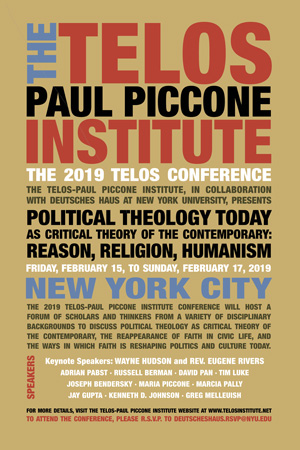The 2019 Telos-Paul Piccone Institute Conference
February 15–17, 2019
New York, NY
The Telos-Paul Piccone Institute, in collaboration with
Deutsches Haus at New York University, presents
Political Theology Today as Critical Theory of the Contemporary: Reason, Religion, Humanism
Keynote Speakers:
Wayne Hudson, Research Professor at the Australian Centre for Christianity and Culture, Charles Sturt University, Canberra, and an Adjunct Professor at the University of Tasmania.
Eugene F. Rivers III, Co-founder and Director, Seymour Institute for Black Church and Policy Studies; Pastor of the Azusa Christian Community Church; Co-founder of the Boston TenPoint Coalition; and Co-chair of The National TenPoint Training Institute.
View the conference program (PDF)
Conference videos
Conference Description
 Across the globe the liberal logic of capitalism and technocracy has seemingly triumphed, and with it a culture of secularism, now the dominant ideology of the liberal establishment that prefers progress to tradition, an individualized identity to a sense of shared belonging, and free choice to common purpose. As much as this regime has produced wealth, it has also generated inequality and dissatisfaction. The populist insurgency that is sweeping the West is in large part a repudiation of this secular politics, opening the space for a post-liberal political theology. A resurgence of religion is underway that marks the failure of the secularization thesis and the need for alternative cultural resources, beyond positivism, to understand the place of humanity within the cosmos. Is this our new "Great Awakening"?
Across the globe the liberal logic of capitalism and technocracy has seemingly triumphed, and with it a culture of secularism, now the dominant ideology of the liberal establishment that prefers progress to tradition, an individualized identity to a sense of shared belonging, and free choice to common purpose. As much as this regime has produced wealth, it has also generated inequality and dissatisfaction. The populist insurgency that is sweeping the West is in large part a repudiation of this secular politics, opening the space for a post-liberal political theology. A resurgence of religion is underway that marks the failure of the secularization thesis and the need for alternative cultural resources, beyond positivism, to understand the place of humanity within the cosmos. Is this our new "Great Awakening"?
Amid the crisis of rationalism, critical theorists such as Jürgen Habermas have sought to rescue the project of a reasonable humanism from the twin threats of religious fundamentalism and secular naturalism. Yet Habermas's conception of postsecularity remains residually secularist because he does not permit faith to make any substantive or critical contribution to public discussion that could undermine the primacy of formal, procedural reason. In response Pope Emeritus Benedict invoked Adorno and Horkheimer's dialectic of enlightenment because the slogan "reason alone" leads to the dissolution of reason—to the conclusion that only will and power have any reality. The only way to avoid this outcome is to recall—so Benedict's argument in his much-commented but poorly understood 2006 Regensburg address—that the West's commitment to humanist reason is grounded in the classical and Christian idea that human rationality participates in the infinite reason of transcendence. Otherwise the rational is but the illusion of our own and of nature's will to power.
Meanwhile, new movements such as "accelerationism" appeal to "the dark enlightenment" in an attempt to reclaim nihilism as the ultimate logic of liberation from the limits of history, tradition, and nature. Its response to the crisis of secularism is to double down on the destruction of tradition in the pursuit of an explicit post-humanism. Accelerationism may therefore only be an extension of liberalism, not an alternative. In that case, only political theology—advocacy of a transcendent dimension that upholds humanity against nihilism—remains as today's critical theory.
The 2019 Telos Conference invites contributions on political theology as critical theory of the contemporary: the reappearance of faith in civic life. The focus will not be on intellectual history but rather on how faith is reshaping politics and culture today.
One area of interest will be the changing status of religion and politics in the "secular" West itself: changing understandings of First Amendment issues in the United States, the role of faith-based organizations in civic life, and the significance of tradition and religious identities in the populist movements across Europe. Of vital importance in this discussion is the role of the African American churches in the contemporary political field.
At the same time, these developments in the area of religion may require us to rethink our "secular" social and political institutions. If nationalism has often functioned as a kind of state religion, it will be important to understand the relationship between nationalism and religion, as well as to explore the ways in which different faiths either stabilize or undermine state administrative structures. As these structures have generally enforced a particular perspective on the sacred foundations of the state, it will be important to understand the ways in which these structures might respond to change in this area.
A second concern goes beyond the West to explore the global resurgence of religious allegiances, including the spectacular growth of charismatic movements in Christianity as well as other world religions, and the questions it raises about modernity: for example, in what ways is the present religious awakening an intensification of modern thought and practice or a rupture with it? How can we understand the transformations of Islam, the rise of Hindu nationalism, but also the spread of Pentecostalism and evangelical Protestantism in, for example, Latin America? How will Africa redefine Christianity and challenge liberalism? What are the consequences for political structures and economic activity?
A third issue is the growing bifurcation—within and across different faiths—of traditional, orthodox traditions, on the one hand, and modernizing creeds, on the other hand. Examples of this paradoxical development include the opposition between more liberal and more conservative wings in the Roman Catholic Church and the Anglican Communion or the religious resistance to unbridled "free-market" capitalism and secular liberal democracy that is shared by various faiths. Can one speak of similar political theological divides between orthodox and reform wings of Judaism in comparable terms?
Furthermore, the conference seeks to examine the juxtaposition of confessions, whether in terms of "clashes" or the issues at stake in conversions—the sectarian tensions and conflicts between different denominations, including Catholic, Orthodox, and Protestant but also Shia versus Sunni and political versus apolitical Hinduism and Buddhism. One question that arises is whether forms of literalist extremism are mirror images of rigid secularism and what they mean for political theology today.
The specific topics of the conference include, but are not limited to, the following:
- religion as a source of post-liberal community
- liturgy and the critique of positivism
- tradition as a source of meaning and orientation
- political theology of secularism and liberalism
- new nihilism: accelerationist philosophy and transhumanist technology
- faith, feeling, and habit in the public political sphere
- the nature of the present religious revival and its relationship to modernity
- bifurcation within and across political religion
- the clash of confessions and "secular sectarianism"
- the role of the sacred in state structures
- the relationships between religious and political movements
Conference Videos
Welcome:
Anthony Tamburri, Maria Piccone, and David Pan
Plenary 1:
David Pan, "Interpretation and Decision: The Political Theology of Walter Benjamin and Carl Schmitt"
With Wayne Hudson, Marcia Pally, and Eugene Rivers
Moderated by Adrian Pabst
First Keynote Presentation by Wayne Hudson:
Rethinking Political Theology
Moderated by Adrian Pabst
Plenary 2: "Political Theology, Civilization, and Ideology"
With Joseph Bendersky, Dustin J. Byrd, and Greg Melleuish
Moderated by Tim Luke
Parallel Session 1: "Faith, Populism, and Liberal Democracy"
With Brendan Mullen, Giada Scotto, Marcin Składanowski, and Pekka Sulkunen
Moderated by Marcia Pally
Parallel Session 3: "Color and Creed: Political Theologies in Pentecostal and Evangelical Churches"
With Kenneth D. Johnson and Luis Aránguiz Kahn
Moderated by Jay Gupta
Second Keynote Presentation by Eugene F. Rivers III:
"Religion and the Intellectuals: From Partisan Review to Telos"
Moderated by Russell A. Berman
Plenary 3: "Critical Theory of Liberalism as Secular Political Theology"
With Edward Hadas, Márton Hoványi, Austin Kopack, Marcia Pally, and Kohei Nagashima
Moderated by Tim Luke
Plenary 4: "Nature and Nihilism: The Political Theology of the 'Dark Enlightenment'"
With Courtney Hodrick, Tim Luke, Adrian Pabst, and Peter Y. Paik
Moderated by David Pan
